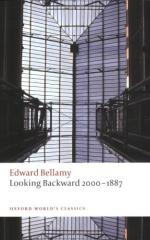
|
| Name: _________________________ | Period: ___________________ |
This test consists of 15 multiple choice questions and 5 short answer questions.
Multiple Choice Questions
1. What is the date when the narrator wakes up?
(a) June, 2000.
(b) September, 1887.
(c) June, 1887.
(d) September, 2000.
2. What does the narrator say the city in general demonstrates?
(a) Destruction of society.
(b) Material prosperity.
(c) Peace.
(d) Decline.
3. What is located in the front of the distribution center?
(a) An advertisement.
(b) A sign with the store name.
(c) Displays of goods.
(d) A statue of the female ideal of Plenty.
4. According to Dr. Leete, what do large conglomerations do?
(a) Effectively manage supply and demand.
(b) Treat workers fairly.
(c) Create an unequal pay system.
(d) Fix prices and destroy competition.
5. What is the labor class's chief weapon?
(a) Education.
(b) Strikes.
(c) Wealth.
(d) Leadership.
6. Why is Julian surprised when the waiter is so pleasant?
(a) They came in so late and he was about to get off work.
(b) Because he is so busy.
(c) They are rude to him.
(d) In 1887, it is a menial job.
7. What year does the narrator assure the reader he does not mean?
(a) 2000.
(b) 1857.
(c) 1757.
(d) 1957.
8. What about Edith calms Julian?
(a) Her hair.
(b) Her voice.
(c) Her laughter.
(d) Her hands.
9. What are men motivated by with this system?
(a) Avoiding punishment.
(b) Honor, hope, and patriotism.
(c) Obtaining wealth.
(d) Obtaining status.
10. How do Dr. and Mrs. Leete feel about Julian walking the city alone?
(a) Angry.
(b) Afraid for his safety.
(c) Surprised.
(d) Happy about his venturing out.
11. Who does the narrator live with in 1887?
(a) He lives alone.
(b) Dr. Leeke.
(c) Sawyer.
(d) Edith.
12. By the end on Chapter 14, what does Julian state is the most distinguishing facility of 2000?
(a) The education system.
(b) Aquired wealth.
(c) Architecture.
(d) Dignity given to the labor force.
13. What does the narrator say about society in Boston in the mid 19th century?
(a) It is unlivable.
(b) It is deeply divided.
(c) It is a utopia.
(d) It can be improved.
14. What does the narrator do to remedy his disorder?
(a) Take medication.
(b) Write reminder notes.
(c) Lock his bedroom door.
(d) Build a sleeping chamber.
15. Who is the sole employer in Boston 2000?
(a) The largest corporation at the time.
(b) The people.
(c) The government.
(d) An international committee.
Short Answer Questions
1. Where does the narrator assume the ash around his sleeping chamber comes from?
2. How long do people serve as common laborers before they can enter professional schools?
3. In 1887, what could a man volunteering to be a waiter not be according to critics?
4. What are an individual's possessions limited to in 2000?
5. In Boston 2000, why are all men entitled to a decent life?
|
This section contains 427 words (approx. 2 pages at 300 words per page) |

|




